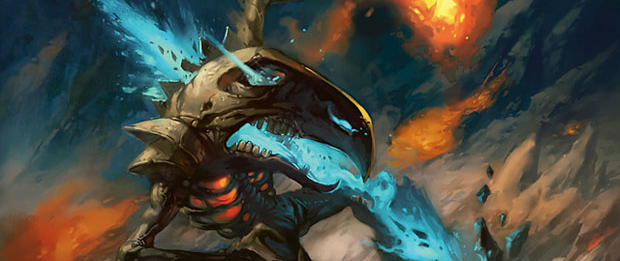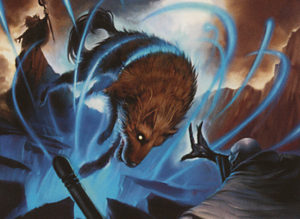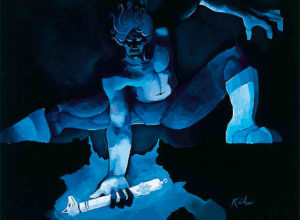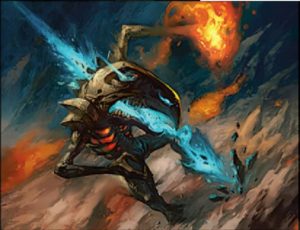Top 16 Blue Cube Counterspells – Part 1 of 4

We all love a good list and we all love a good counterspell! Well, perhaps not so universally with the latter but nonetheless I thought I should combine these two great things. The cards are rated here on their ability to disrupt spell casting and not entirely on their raw power as cards. If this were a list of the most powerful counter spells then I would have to rearrange the list quite significantly. What makes a good counterspell is a combination of; how cheap it is to use, how effective it is at countering something, how broad a range it has and how good the position it leaves you in after playing it.
#16 – Spell Snare

Spell Snare is a very powerful and highly efficient counterspell. It is playable from turn one and loses no real power over the course of the game compared to cards like Force Spike and Mana Leak. Making sweeping statements in Magic is dangerous however I can safely say that every (viable) cube deck will have two drops in it, thus making Spell Snare highly playable. Certainly some decks will have far more targets and some will have more important targets meaning some variance in the performance of the card based on match-up but this can be expected with most cards. At its best, Spell Snare is one of the more powerful cards on this list and at its worst it is still better than the majority of the cards when in their worst case scenario.
There are several reasons why Spell Snare, despite all its qualities has ended up at the bottom of the pile and presently doesn’t have a slot in my cube. Firstly, it is a card that is vastly superior when you are on the draw than it is when you are on the play. It can totally save you against a powerful tempo opener on the draw while on the play it is far less likely to give you a significant advantage. On the play I would almost always prefer to have a counterspell that had more potential targets even if it cost two. The result of all this was lots of fiddling around side boarding to optimise decks which frankly got tedious. The second big flaw I find in Spell Snare is that it serves very little specific purpose in the cube, you never play it really to deal with something generic as you might with a Disenchant or Negate effect. You don’t play it as a one drop as you might with Force Spike as it isn’t a useful one drop when on the play as discussed. You play a certain number of counterspells in decks that want them as they are decent coverall security and disruption however Spell Snare is too limited in its targets to be a good coverall or security card.
You cannot really give away your counterspell slots to a card like Spell Snare and maintain the same level of control over a game. Almost all the reasons to play Spell Snare are contextual rather than archetypal. You play it when you need to counter their two mana combo card, when you are on the draw or when they are an aggro deck with over 25% of their list costing two mana. It is rare that you construct a deck that can consistently take advantage of a cheap yet specific hard counter, the only guaranteed advantage of it is that you will have spent half the mana your opponent did. It would need to be a tempo deck with card advantage and/or quality in reasonable abundance that still had sufficient room for reactive non-specific disruption. It is a personal choice but I like to advocate cards that reward and promote good deck construction and design which Spell Snare rarely does in the cube.
#15 – Pact of Negation
When you are a combo deck, or when you are any deck about to win the game Pact of Negation is the very best card to have. It stops basically anything a counterspell can, which is most things, and costs you no mana to play. These were my main two criteria in assessing the strength of a counterspell and so Pact of Negation is the best of the best in an optimal situation. Combo features little in most cubes and the non-combo decks will spend the majority of their game time not on the verge of winning. This means you have to consider the upkeep cost of Pact of Negation for the majority of decks you might consider playing it in. Three is a lot of mana to pay to counter something in the cube, five is incredibly painful. It is unusable normally until you have your five mana and can still present a risk of death once you have the five should they have any way to disrupt your mana production. Typically the kinds of deck that want coverall counterspells also want to leave mana up to be reactive, having to tap five mana in your upkeep will make the turns following a Pact of Negation deeply uncomfortable until you have lots and lots of mana. Although the best when it is good, it is close to the lowest when not optimal. I do not have Pact of Negation in my cube presently however its value rapidly increases as the number of suitable archetypes for it increases. With cube design being as diverse as it is you can easily include more of those archetypes from one of a few different approaches. Pact of Negation is unlike most other counterspells in that it is one that you only really play to force other things through. It should not be played as a coverall answer or a control card.
#14 – Forbid
I earlier stated that three mana was a lot to pay for a counterspell in the cube despite it being a fair price for a universal hard counter in most other formats. This applies to Forbid which does not see huge quantities of play as a result. Forbid has a powerful built in recursion effect than can even be used to your advantage should you need a discard outlet however it really requires you to have some kind of engine built around it otherwise it is too onerous on your resources to be an efficient answer. It is also an expensive way on mana, not just cards, to try and control a game. Needing an engine makes Forbid a somewhat narrow card although not to the same extent as Pact of Negation. One thing strongly in the favour of Forbid in the cube as opposed to any other format is that there being only one copy of any given card there is quite a sharp tail off in the quality of groups of spells. Very few cube worthy counterspells will hit any kind of spell and counter it regardless of how much mana your opponent has spare. Even fewer counterspells that are on the cheaper side of things. This leaves Forbid at about the fourth best universal hard counter under four mana that has no extra costs attached to it. You could argue Dissipate was better however it has no extra synergy to offer and is just a three mana counterspell thus rendering it too weak for cube.
It’s the extra buyback utility that secures it a cube slot, however, the fact it’s just another hard counter that plugs a hole is the main thing that gets it its play time. Forbid scales in a fairly unusual pattern as the game progresses compared to all the other counterspells. In the super late game, the point at which land draws are basically dead draws, Forbid suddenly starts to gain a lot more value even when used in decks with no engines or intent to abuse the buyback. Another perk that Forbid has going for it is that it offers lots of choices when played which makes for better games and a greater test of skill. There are those matchups that revolve around a few key cards, you might chose to buyback a Forbid on turn three pitching two useful cards because you have no other answers in hand to the remaining key cards they have. This kind of play would almost always be wrong against an aggressive deck full of redundancy or a control deck where the card advantage is too important but there will be matchups where it is right to do, not to mention something no other counterspell can offer.
#13 – Mental Misstep
Mental Misstep is similar to Spell Snare in many ways and is generally lighter on viable and powerful targets yet it achieves a higher ranking than the Snare. This is because it is a purposeful card, you can put it in a deck and improve that deck with no prior knowledge of your opponents deck or who is on the play. Misstep feels more like Force Spike than Spell Snare when you play it and has many of the same qualities and requirements when being built into a deck. Both Force Spike and Misstep are likely to be hard counters for an opponents first turn play. The value of having them or drawing them however declines as the game progresses, although with Misstep it is not because the counter becomes easier to avoid but because the targets for it have been used or cease to be overly relevant themselves. To maximise the power of Mental Misstep in a deck you are advised to have some filter and/or card quality effects so that you can replace it once its value is diminished.
To get mana advantage out of the card you have to pay two life however the strength of the card is not so much that you can be one mana better off than your opponent over an exchange but that you can make the exchange when you have no spare mana. Both Mental Misstep and Spell Snare are opportunistic cards that you want to have open as often as possible so as to maximise their somewhat limited range of targets. To do this with Spell Snare can be uncomfortable and even obvious while with Misstep you can happily tap out with added safety. As with Pact of Negation you can also play Misstep off colour however the latter will be of greater use throughout the game and far more likely as a result to find itself in a non blue deck. It still tends to be the blue decks that play it as it is such an effective way to bolster your early game when you lack low curve cards which is something blue struggles with more than the other colours in Magic. The main thing I have against Mental Misstep is that there are many viable decks without any one drops and plenty more without any concerning one drop plays. This makes Mental Misstep a little unreliable which reduces the amount it gets played.
12# – Mana Leak

Dull but fairly effective. Only when you reach super late game top deck mode does Mana Leak cease to be a reliable counterspell. You can play around Force Spike fairly easily but trying to have three spare mana after doing something useful is a tall order. In the early game Mana Leak is better than Actual Counterspell as it is almost always a hard counter and is less demanding on your mana. Although this is a very strong and reliable card the few times it does not do what you want it to really hurt. Those times when Counterspell wins the game but Mana Leak loses it stick with you and make you resent the Leak. Mana Leak will always be the poor mans Counterspell. When you need it you play it but it is almost always because you failed to get something else better that you could play instead. Mana Leak is at least the first card so far on this last to be played in the capacity you would expect counterspells to be played in – when you need cheap reactive coverall security. The only thing you really need to bear in mind when playing it is that it scales poorly compared to many counterspell options as the game progresses. Not to the same extreme rate that Force Spike drops in power but in a format as explosive and powerful as the cube Mana Leak will be getting weaker faster than you might expect. With this knowledge it is best to play the Mana Leak earlier where possible and sensible. Playing with Mana Leak will also increase the power of your card quality and filter effects. It might seem with this in mind that Miscalculation is the more potent card for this role within the cube as it does much the same thing but with a built in card filter mechanism. After much testing it turned out that Miscalculation was closer to Force Spike in terms of its poor scaling into the late game than it was to Mana Leak. Having to pay one more mana gets a surprisingly large amount more done in the mid game. Miscalculation would either trade fairly evenly, be used on something of low significance simply to get it used before it was dead or get instantly cycled. It is a playable cube card but it isn’t very efficient or effective which is not sufficiently compensated for by its cycling. Mana Leak does an awful lot more of the thing you are playing the card to do than Miscalculation and turns out to be a fair chunk better in the cube as a result!
Check out the next instalments as we list the Top 16 Blue Cube Counterspells in this four part series!







